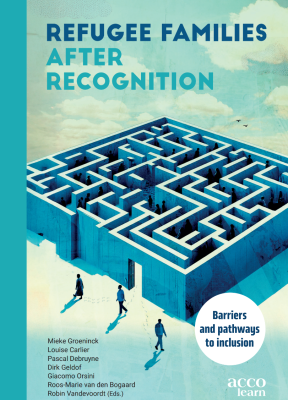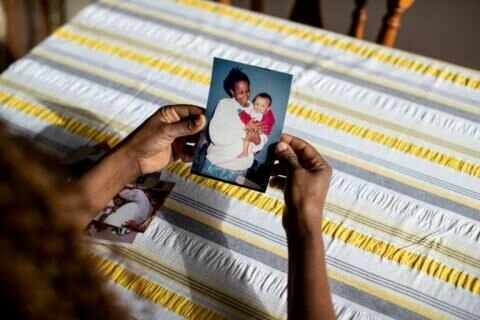REFUFAM: Strengthening the well-being and integration of refugee families
REFUFAM is short for the project 'From policy gaps to policy innovations. Strengthening the well-being and integration pathways of refugee families'. It examines how Belgian migration and integration policy can be reshaped to strengthen the integration process of refugee families.
This interuniversity project also has its own project website: Refufam.be
Publications
Boek 'Refugee families after recognition'
At the closing conference on 23-24 April 2025, the book was presented that will enable the findings to reach a wider audience. This book is published by Acco and is available in Dutch, French and English.
Policy Briefs
On 31 January 2025, the research group presented their findings and recommendations, based on interviews and group discussions with 98 members of refugee families and with 99 practitioners from primary and secondary care. The conclusion is simple: another way of “integrating” is possible!
- Read de policy briefs.
- De Standaard published on 31/01/25 the article 'Hoe moet integratie van nieuwkomers in België écht? Drie lessen uit de wetenschap'
Book 'Refugee families after recognition'
When refugee families finally receive recognition and leave the refugee centre, they must build a new life in Belgium. This proves far more complex than finding a house, enrolling their children in school, or starting a civic integration course. Reception policies are fragmented across different levels and domains. They show numerous gaps and discrepancies that obstruct and delay the inclusion process of recognised refugees.
In this book, we highlight the experiences of the refugee families themselves. How do they cope with the opportunities and obstacles to build a new life in Belgium? How do social workers and volunteers experience the fragmented and often contradictory policies that refugees are confronted with? What happens when policies raise barriers that restrict refugees’ social inclusion?

Interdisciplinary research
REFUFAM consists of three components, each building on a different discipline:
- a legal-political pillar examines the institutional design of asylum and integration policy in Belgium;
- a psychosocial pillar studies the mental well-being of refugees and their family members;
- a sociological pillar documents the local integration trajectories of refugees and their family members.
From this interdisciplinary approach, REFUFAM aims to provide scientific evidence on the impact of public policies and innovative support practices on the well-being and integration trajectories of refugees and their family members.
Role of the Centre for Family Studies
The Centre for Family Studies is one of the partners and is responsible for the second part of this research project: what is the state of psychosocial well-being of refugee families and what is the impact of policies and support structures throughout the integration process on their well-being?
Partners
Het consortium van REFUFAM bestaat uit:
- CESSMIR (Centre for the Social Study of Migration and Refugees, Dep. Sociaal Werk en Sociale Pedagogiek, Dep. Architectuur en Ruimtelijke Planning, Onderzoeksgroep Migratierecht, Universiteit Gent);
- Métrolab (UCLouvain/ULB);
- Odisee's Centre for Family Studies.
REFUFAM is funded by the research programme BRAIN-be 2.0 (Belgian Research Action through Interdisciplinary Networks) of the Belgian Science Policy Office (BELSPO).
Werkzaamheden
In 2021-2022, the main focus of the programme was a thorough literature review. In consultation between the different project partners, we developed a common, interdisciplinary research framework. The results were shared via internal working papers and discussion papers with the project partners.
Researcher F. Zehra Colak, who worked on the project until 30 September 2022, interviewed about 20 experts and field workers. Researcher Mieke Groeninck continued the expert interviews and took on the interviews with recognised refugee families.
During academic year 2022-23, data collection took place on the basis of 24 in-depth interviews with experts (psychologists, volunteers, social workers). Mieke Groeninck also talked to 26 refugee families (mostly she had two interviews per family) across Flanders and Brussels: 7 from Palestine, 6 from Afghanistan, 5 from Syria, 4 from Turkey, 1 from Somalia, 1 from Morocco, 1 from Rwanda and 1 from Eritrea. 16 families had gone through a process of family reunification.
Together with the family, she identified the local actors who offered support to this family. She then also interacted with these - a total of about 30 - actors.
In each of the municipalities, she also conducted a limited ethnographic participatory observation, in that she was the informal buddy for 6 months to 1 year of one family per municipality.
On 23-24 April 2025, the project concluded with the international conference Navigating the Politics of (Dis)Integration: Refugee Families' Pathways to Inclusion.
At this conference, the publication that will be made available in three languages was also presented: Refugee Families After Recognition: Barriers and Pathways to Inclusion.
Rearch Team for Odisee
- Researchers: Mieke Groeninck, F. Zehra Colak (unitl September 2022)
- Promotor: Dirk Geldof
- Co-promotor: Pascal Debruyne
Image: Oxfam Australië
